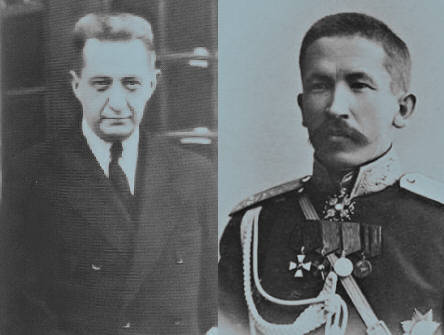In some respects the First World War provides material for a work that could be titled: The Complete Guidebook on How Not to Do Things. We will revisit some of the war's most colossal blunders periodically in Roads to the Great War. Our first entry was something of a double-barreled disaster.
Alexander Kerensky and General Lavr Kornilov
With the failure of the 1917 offensive of the Russian Post-Tsarist Provisional Government, Supreme Commander Alexi Brusilov's stock plummeted and his advocacy of executions to restore discipline in the army made him politically unpalatable to the Provisional Government. He had to go. Alexander Kerensky, now Prime Minister, selected heavy-handed General Lavr Georgevich Kornilov to replace him. On political matters, this would be roughly analogous to George Patton replacing Dwight Eisenhower as Supreme Allied Commander in World War II. It was an appointment doomed from the start.
Kornilov's solution for restoring discipline turned out to be even more threatening to the revolutionary cadres than Brusilov's. Kornilov believed it was imperative to repeal Order No. l, issued by the Petrograd Soviet in March 1917, which made all military orders dependent upon its consent and placed discipline at a regimental level under the discretion of soldiers’ councils rather than in the hands of officers. Kerensky simply could never agree to such a fundamental change and an overly-candid speech by Kornilov at a conference in Moscow further alarmed him. He began seeing Kornilov as a Napoleon in the making with backing from the right. Whether imagined or real, charges of a coup were levied when Kornilov sent troops to Petrograd to maintain order. Kornilov responded to the charges by calling for the overthrow of the Provisional Government, sealing his fate. He would be dismissed, jailed, and, after escaping, become a counterrevolutionary commander in the Don Basin where he would be killed in April 1918.
Kornilov's fate, though, is much less interesting than the damage caused by Kerensky's handling of the episode. The Petrograd Soviet was called upon to oppose Kornilov's deployment to the capital. But, the only military assets they had were controlled by the Bolsheviks, who gained the authority from the Soviet to form a Red Guard. So Lenin's followers were given an opportunity to reverse their fading fortunes. They helped suppress the "coup", rehabilitating the Bolshevik's reputation, and gained a permanent presence. Trotsky would later write, "the army that rose against Kornilov was the army-to-be of the October Revolution."
Kornilov's solution for restoring discipline turned out to be even more threatening to the revolutionary cadres than Brusilov's. Kornilov believed it was imperative to repeal Order No. l, issued by the Petrograd Soviet in March 1917, which made all military orders dependent upon its consent and placed discipline at a regimental level under the discretion of soldiers’ councils rather than in the hands of officers. Kerensky simply could never agree to such a fundamental change and an overly-candid speech by Kornilov at a conference in Moscow further alarmed him. He began seeing Kornilov as a Napoleon in the making with backing from the right. Whether imagined or real, charges of a coup were levied when Kornilov sent troops to Petrograd to maintain order. Kornilov responded to the charges by calling for the overthrow of the Provisional Government, sealing his fate. He would be dismissed, jailed, and, after escaping, become a counterrevolutionary commander in the Don Basin where he would be killed in April 1918.
Kornilov's fate, though, is much less interesting than the damage caused by Kerensky's handling of the episode. The Petrograd Soviet was called upon to oppose Kornilov's deployment to the capital. But, the only military assets they had were controlled by the Bolsheviks, who gained the authority from the Soviet to form a Red Guard. So Lenin's followers were given an opportunity to reverse their fading fortunes. They helped suppress the "coup", rehabilitating the Bolshevik's reputation, and gained a permanent presence. Trotsky would later write, "the army that rose against Kornilov was the army-to-be of the October Revolution."
Source: Our March 2013 issue of Over the Top: A Magazine of the First World War
Click here for more information on our magazine:
(downloadable flyer)
Click here for more information on our magazine:
(downloadable flyer)
[*]"War is mainly a catalogue of blunders."
From Winston Churchill's History of the Second World War
From Winston Churchill's History of the Second World War


Kornilov was a bad choice but did Kerensky have someone else available who might have been a good choice?
ReplyDeleteThis was interesting, but the writing style made it difficult to follow. For instance, "Patton replacing Eisenhower" can be read to mean Patton DOING that--as opposed to someone (like FDR or MArshall) replacing Eisenhower with Patton.
ReplyDelete